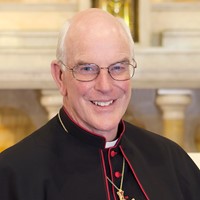The patrician Eutropius, until yesterday the greatest power in the empire after the young Emperor Arcadius himself, and Consul for the year, clings now to the foot of the altar, a fugitive from the emperor’s wrath. “His face,” remarks the preacher, “is no better than the countenance of one dead: and the chattering of his teeth, and the quaking and quivering of his whole body, and his faltering voice, and stammering tongue, and in fact his whole general appearance…suggestive of one whose soul is petrified.”
The preacher, Patriarch John ‘Chrysostom’ (the ‘golden-mouthed’), spends much of his sermon telling Eutropius, “I told you so! Where now are your cup-bearers, where are they who cleared the way for you in the market place, and sounded your praises endlessly in the ears of all? They have fled, they have disowned your friendship, they are providing for their own safety…” Nevertheless, says John, “I do not abandon you…I protect and tend you. And the Church which you treated as an enemy has opened her bosom and received you into it.” Eutropius had, ironically, just a year earlier tried to impose restrictions on the Church’s right to grant sanctuary.
After he had finished lecturing Eutropius on the text “Vanity of vanities, all is vanity”, however, Chrysostom turned his remarks to the angry crowd who wished to vent its rage on the fallen man: “Wherefore are you indignant with me? You say it is because he who continually made war on the Church has taken refuge within it….This is an ornament for the altar. A strange kind of ornament, you say, when the accused sinner, the extortioner, the robber is permitted to lay hold of the altar. Nay! Say not so: for even the harlot took hold of the feet of Jesus…” In the end, Chrysostom proposes that the congregation should “unite to approach the merciful Emperor beseeching him for the sake of the church, for the sake of the altar, to concede the life of one man as an offering to the Holy Table… We shall have the approval of God, who will bestow a large recompense upon us for our mercy. For as he hates the cruel and inhuman, so does he welcome the merciful and humane…” In the event, Chrysostom managed to sway the crowd and the emperor. Eutropius was permitted to leave in safety for exile in Cyprus, though Arcadius did change his mind some months later and then had him executed.
What we have been looking at is one of the most celebrated and dramatic instances of ‘sanctuary’. It comes, of course, from a time within a generation or two of the first Christian rulers of Rome. The suggestion is sometimes made that the notion of ‘sanctuary’ was based on the Old Testament ‘cities of refuge’ said to have been set up in Israel by Joshua. But they were for people who had accidentally committed homicide, to save them from vengeful relatives until they could be tried fairly. John Chrysostom, on the other hand, clearly knew that Eutropius was guilty. He granted sanctuary to a guilty man specifically to witness to Christian teaching: “Be merciful as your Father is merciful.” We also see in the account, I think, the reluctance of a Christian society to defile a holy place by acts of violence. These two aspects of ‘sanctuary’ feature repeatedly, too, in the far more generalised provision of ‘sanctuary’ in churches that developed in the Middle Ages in Europe. Often, of course, ruthless kings and barons violated ‘sanctuary’. It nevertheless entered into common law as a period of forty days in which the miscreant could be allowed to save his life by agreeing to go into permanent exile. For certain specified places of ‘sanctuary’, this remained the law of England until 1623.
These days, ‘sanctuary of the church’ has no legal standing. Generally these days, people trust the law to deliver justice and don’t see ‘mercy’ as a thing to be much desired in judicial practice, except, of course, for Australians convicted overseas. Neither do people like the Church ‘interfering’ in public life. Why, then, has the offer of Church ‘sanctuary’ for asylum-seekers struck such a chord in the community? Not for the old reasons, I would suggest, that mercy is a good thing and churches are ‘holy’ places. Rather, it is because a good part of the Australian people recognises that in this instance our law is not good, not fair and not just, and thinks that someone, anyone, even the Church, should stand up against it. The people do still have a moral sense about how innocent strangers are treated, and the leaders of our major parties would be wise not to ignore this. For twenty years they have been afraid to appeal to that decency in Australians. Now might be the time. What else can it mean, that so many Australians believe asylum-seekers actually need ‘sanctuary’, sanctuary from our own government?























































































